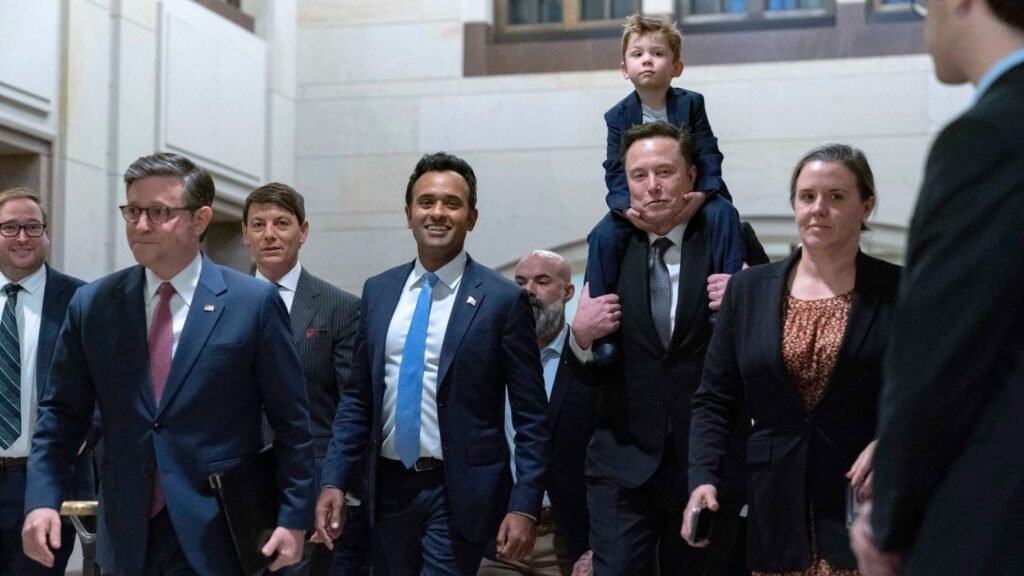Long before the current occupant of the White House, a young and overconfident man arrived at the presidential office with the slogan “Make America Great Again.” He invited a posse of business people headed by a leading industrialist to Washington to work like ‘tireless bloodhounds’ to sniff out inefficiency in Washington’s huge bureaucracy.
This was in 1982, when President Ronald Reagan’s Grace Commission started looking for ways to cut hundreds of billions of wasteful spending.
Similar to President-elect Donald Trump’s “Department of Government Efficiency” headed by Elon Musk and Vivek Ramaswamy, or the Grace Commission, it had no power to effect change, only to recommend.
And after two years of work, the Grace Commission’s 150 plus members convinced Congress to pass not a single one of its recommendations.
“You cannot find any evidence that they altered the growth of the government one bit,” said Douglas Holtz-Eakin, president of the center-right think tank, the American Action Forum, in an interview with USATodayWorld . “There are lots of little examples of successes” by the group, he said. “But I think you should ask Elon and Vivek what makes them different than the Grace Commission.
As in 1982, in 2024, there is a general agreement that the federal budget is too large and could use a rationalization by an inexperienced person to make the government work better and spend less money from the taxpayers’ pocket. Some economists on both the left and right said to USATodayWorld that they would welcome any attempts to curb the deficit and rein in government spending. However, up to this point, neither Musk nor Ramaswamy appear to understand the intricacies of the $6.8 trillion US budget.
“We keep pretending the federal budget is like sitting at the kitchen table, figuring out the family’s finances,” said Holtz-Eakin, a former adviser to John McCain’s 2008 campaign and budget chief under President George W. Bush.

The Math Problem
Musk and Ramaswamy will have a math problem on their hands right away on how to cut spending in half — or even if they pledge to Musk’s $2 trillion.
Mandatory spending, which includes Medicare, Medicaid and Social Security, accounts for about 60 percent of the federal government’s budget. The American people would never stand for severe reductions in those programs, and it would be political suicide to try to make such cuts in Congress. Trump has also vowed to defend the social security.
Another 10% is used to pay the interest on the Uncle Sam’s debt mountain. Neither of that can be touched either, at least not without triggering a global debt crisis and stock market crash.
Which is about 30% that is considered flexible, but half of that goes to defense which is another area that would be difficult to significantly reduce.
“Reducing spending by $2T annually will be very challenging without affecting mandatory spending, which means that lawmakers will have to make the necessary choices they have been either unwilling or unable to make,” Isaac Boltansky, director of policy research at BTIG, said in a report to clients.
Nondefense discretionary spending has already been cut back, and is now at the lowest level in modern history as a percent of GDP, says Mark Zandi, chief economist at Moody’s Analytics.
That is why Zandi stated that he has doubts that emphasis on the government’s efficiency could produce even $200 billion per year of annual savings, not to mention $2 trillion.
“I support all attempts to enhance the productivity of the government,” Zandi said. “But there’s no game-changing 60-yard touchdown pass here.” There will be a lot of one or two yards carry.”
A Two-Pronged Approach
In an op-ed piece in the Wall Street Journal last month, Musk and Ramaswamy outlined their general plan to focus on “the half a trillion dollars plus in annual federal spending that is either unappropriated or being spent in ways that Congress did not intend.”
But how, exactly?
There is a way, albeit unconstitutional, through which the president can ignore Congress and simply not spend money that has been appropriated. It’s called impoundment.
“I don’t think DOGE’s recommendations will pass through Congress anytime soon and my threat level is low,” said Bobby Kogan, the senior director for federal budget policy at the Center for American Progress, a left-leaning policy research group. “My threat level for them doing some things illegally, unilaterally, is incredibly high.”
Trump has time and again declared that he would seek to overturn the law that was enacted during the Nixon administration that limited the president’s authority to withhold funding for projects that have been endorsed by Congress. The DOGE bros are also on board, stating in their op-ed that they think the Supreme Court would rule in Trump’s favor.
A representative of the Trump transition team declined to comment on the issue.
The exact nature of an impoundment strategy is unclear. Newt Gingrich, the former House speaker and adviser to Trump, told the Washington Post last month that the administration would likely try a two-pronged strategy: requesting Congress to endorse severe reductions in expenditures, and at the same time, challenging the power of the president to rescind funds on its own.
For instance, if the White House wanted to pause federal funds to schools with vaccine mandates, as the president-elect has proposed, the school or local government would sue. That order would be subject to the courts to either affirm or reverse, which could delay essential funds for months or years.



